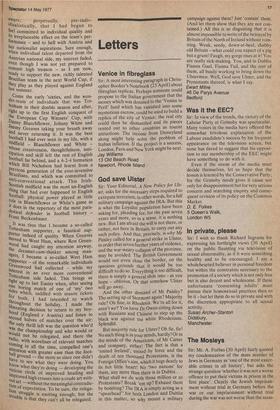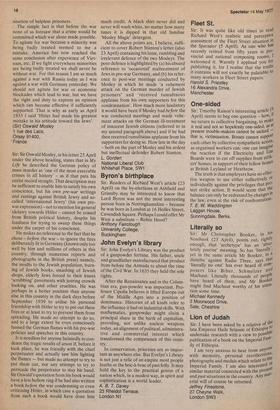The Mosleys
Sir: Mr. A. Forbes (30 April) fairly quoted my condemnation of the mass murder of Jews in Germany as `one of the most execrable crimes in all history', but asks the strange question 'whether it was not a worse offence to put their victims in prison in the first place'. Clearly the Jewish imprisonment without trial in Germany before the war or our imprisonment without trial during the war was not worse than the assas sination of helpless prisoners.
The simple fact is that before the war none of us foresaw that a crime would be committed which war alone made possible. To agitate for war because a minority was being badly treated seemed to me a mistake. America has now reached the same conclusion after experience of Vietnam, etc. If we fight everywhere minorities are being badly treated we shall never be without war. For this reason I am as much against a war with Russia today as I was against a war with Germany yesterday. We should not agitate for war or economic blockades which lead to war, but we have the right and duty to express an opinion which can become effective if sufficiently supported. That is why as early as April 1933 I said 'Hitler had made his greatest .mistake in his attitude toward the Jews'. (Sir) Oswald Mosley
1 rue des Lacs, Orsay 91400, • France
Sir: Sir Oswald Mosley, in his letter 23 April under the above heading, states that in My Life he described the German policy of mass murder as 'one of the most execrable crimes in all history' – as if that puts his entire record straight. That description may be sufficient to enable him to satisfy his own conscience, but his own pre-war writings and rantings against British Jewry and socalled 'international Jewry' (his own prewar expression) – not to mention his general idolatry towards Hitler – cannot be erased from British political history, despite his fondness for trying to sweep these things under the carpet of his conscience.
He makes no reference to the fact that he chose – before the war – to ignore the fires deliberately lit in Germany (known only too well by him and millions of others in this country, through numerous reports and photographs in the British press) namely, the insults to the Jewish population, burning of Jewish books, smashing of Jewish shops, elderly Jews forced to their knees 'scrubbing' pavements with jeering crowds looking on, and other cruelties. He was perhaps in a better position than anyone else in this country in the dark days before September 1939 to utilise his personal friendship with Hitler to try to put out these fires or at least to try to prevent them from spreading. He made no attempt to do so, and to a large extent he even consciously fanned the German flames with his pre-war policies and speeches in this country.
It is needless for anyone belatedly to condemn the tragic results of arson if, before it took place, he was friendly with the chief perpetuator and actually saw him lighting the flames — but made no attempt to try to put them out, nor any attempt to try to persuade the perpetrator to stay his hand. Sir Oswald's quotation from his book would have a less hollow ring if he had also written a book before the war condemning or even criticising Hitler, in which case a quotation from such a book would have done him much credit. A black shirt never did and never will wash white, no matter how many times it is dipped in that old familiar 'Mosley Magic' detergent.
All the above points are, I believe, sufficient to cover Robert Stanton's letter (also 23 April) containing his lame, rambling and irrelevant defence of the two Mosleys. The poor defence is highlighted by (a) his absurd reference to 'occasional' maltreatment of Jews in pre-war Germany, and (b) his reference to post-war meetings conducted by Mosley in which he made 'a vehement attack on the German murder of Jewish prisoners' and 'received tumultuous applause from his own supporters for this condemnation'. How much more laudatory it would have been if Mosley had before the war conducted meetings and made vehement attacks on the German ill-treatment of innocent Jewish citizens (referred to in my second paragraph above) and if he had then received tumultuous applause from his supporters for doing so. How late in the day – both on the part of Mosley and his ardent but ineffectual defender Robert Stanton. L Gorden National Liberal Club Whitehall Place, SW1



































 Previous page
Previous page